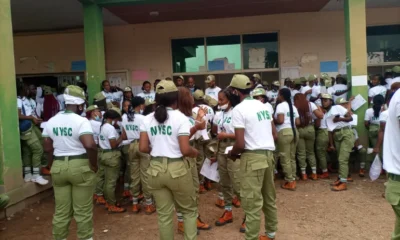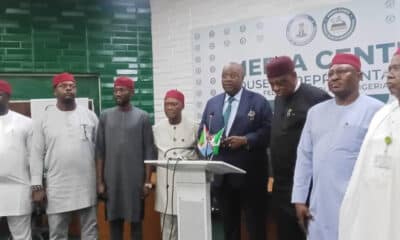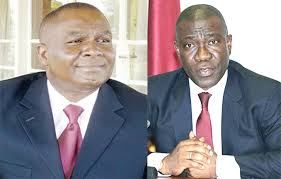Breaking News
Reps Move to Intervene in FG, ASUU Dispute

The House of Representatives has pledged to intervene in the ongoing dispute between the Federal Government and the Academic Staff Union of Universities (ASUU), which has led to the suspension of academic activities across public universities.
This resolution followed a motion of urgent national importance raised by Hon. Sesi Winghan, who represents the Badagry Federal Constituency under the All Progressives Congress (APC) during plenary on Tuesday.
The lawmaker urged the leadership of the green chamber to wade into the crisis and help facilitate dialogue that would bring a permanent resolution to the recurring face-off between the government and the lecturers’ union.
ASUU Strike Grounds Universities Nationwide
On Monday, ASUU began a two-week warning strike after the expiration of a 14-day ultimatum issued to the Federal Government to meet its outstanding demands.
The latest industrial action marks ASUU’s first nationwide strike in nearly three years, causing disruptions in lectures and examinations across various federal and state universities.
According to ASUU, the strike became inevitable after the government failed to honour the 2009 FGN-ASUU Agreement and subsequent renegotiations aimed at improving lecturers’ welfare and university funding.
“Our members have been pushed to the wall. The government has not demonstrated genuine commitment to resolving the issues,” ASUU President, Prof. Chris Piwuna, said on Sunday.
Union’s Demands and Lingering Grievances
ASUU’s key demands include the conclusion of the renegotiated 2009 FGN-ASUU Agreement, release of withheld three-and-half months’ salaries, and sustainable funding for public universities.
Other issues raised by the union include the payment of 25–35 per cent salary arrears, promotion arrears of over four years, and the release of withheld cooperative deductions owed to lecturers.
The union also wants the revitalisation fund for universities reinstated and an end to delays in implementing salary adjustments.
The renegotiation of the 2009 ASUU-FGN Agreement has been stalled since 2017, despite the inauguration of six different committees by successive administrations.
The most recent committee, chaired by Alhaji Yayale Ahmed, was inaugurated in October 2024 and submitted its report to the government in December 2024.
However, according to ASUU, the Minister of Education claimed he did not receive the report until February 2025, further heightening tensions with the union.
FG Enforces ‘No Work, No Pay’ Policy
In response to the strike, the Minister of Education, Dr. Tunji Alausa, ordered vice-chancellors of federal universities to withhold the salaries of academic staff who fail to perform their duties during the strike period.
Alausa stated that the directive was in line with existing labour laws, reaffirming the government’s “no work, no pay” stance.
The minister also instructed universities to conduct physical headcounts of staff present at work and submit compliance reports to the National Universities Commission within seven days.
Reps Promise Lasting Solution
Lawmakers, however, expressed concern that the prolonged dispute between ASUU and the Federal Government continues to hurt Nigeria’s education system, disrupt academic calendars, and frustrate students.
Winghan, in his motion, appealed for constructive engagement and urged both parties to prioritise the future of Nigerian students over disagreements.
“We cannot allow our universities to remain shut every time there’s a disagreement. The time has come for a permanent solution,” the lawmaker said.
Students Lament Disruption of Examinations
Reports from various campuses, including the University of Benin, Federal University Dutse, and Nasarawa State University, indicate that ongoing semester examinations were suspended due to the strike.
At Nasarawa State University, Keffi, ASUU officials were seen moving from hall to hall, ordering students and invigilators to vacate.
A final-year student of the Federal University Dutse, Mary Ajegba, expressed frustration over the repeated strikes.
“If not for ASUU strikes, I should have graduated by now. It’s heartbreaking to keep restarting our lives every time this happens,” she lamented.
The House of Representatives is expected to invite both ASUU and Federal Government representatives for a joint meeting later this week in an attempt to broker peace.
Speaker Tajudeen Abbas is reportedly considering setting up a special ad hoc committee to review the 2009 agreement and identify sustainable funding models for universities.
While ASUU insists that the strike is a warning, many fear it could extend beyond the planned two weeks if the government and union fail to reach an understanding.
For now, the fate of millions of university students hangs in the balance, once again at the mercy of Nigeria’s long-standing education disputes.

























